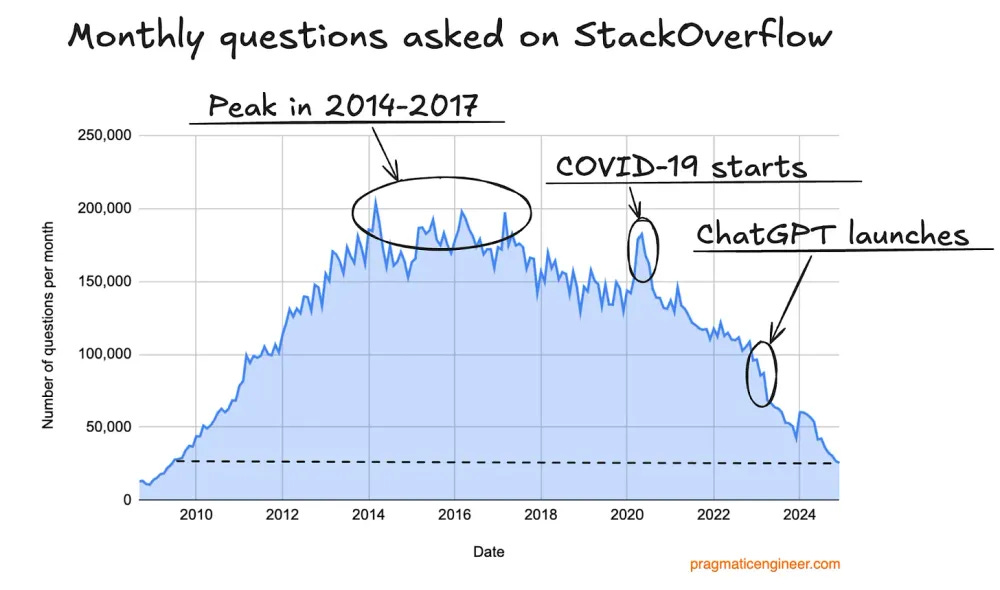The Real End of History: AI Shaking Google’s Hegemony
The dramatic declines in the valuation of Alphabet’s shares on the New York Stock Exchange are the first clear signal that the current monopoly of the Google search engine may be undermined. Artificial intelligence is significantly changing the way we search and process information. Meanwhile, we are dealing with a trend that began a long time ago with a drastic change in our collective consumption patterns. We no longer have to search and interpret, knowledge is at our fingertips. However, this democratization of access to knowledge may turn out to be remarkably undemocratic.
For over two decades, I have dedicated my life to writing about the history of World War II. Each article presented on my website was crafted with care, as I believed that history mattered, and that people searching for answers should find their way to the work of those who are ready to keep memory alive. But this belief was shaken because we are witnessing the real end of history.

One may like or dislike Francis Fukuyama’s concept, one may agree with it or not, but the thesis of the “end of history” has strongly marked contemporary research on international relations. However, the real end of history may mean the suffocation of history as a field of science. And not just history, this field is just an example here that illustrates how our preferences have changed over time.
Alphabet’s stock valuation experienced a significant decline of over 9% following testimony from Apple executive Eddy Cue in a federal antitrust lawsuit. Cue revealed that Apple is exploring alternatives to Google’s search engine for its Safari browser, including ChatGPT and Perplexity. Moreover, he drew attention to the fact that some users are already moving away from Google in favor of AI-powered chatbots. This revelation has intensified concerns about Google’s business model and reliance on a 20 billion dollar yearly agreement with Apple to remain the default search engine on iOS devices. Something that has been one of the foundations of the Google’s hegemony.
Google, once the great gateway of knowledge, might be seeing its dominance slip. Apple’s executive signaled what many of us already witnessed: the way we search is changing, and perhaps irreversibly.
User behavior changes
This transformation is technological and personal at the same time. Users are increasingly turning to AI tools for information retrieval, thus bypassing traditional search engines. It’s easier. We want answers, and we know we can get them. Indeed, we are becoming increasingly lazier, and scientists wonder how this will affect our cognitive abilities, since activity in the entire process comes down to asking a question and doesn’t require much thinking and analytical skills. However, this change in user behavior is a natural transformation in how information is accessed and consumed. It comes directly from our preferences.
Moreover, it is also partly the result of Google abusing its near-monopoly position and monetizing search results. Higher ranking positions can simply be bought, and Search Engine Optimization (SEO) has meant that instead of valuable sites, those whose creators have screwed up the algorithm better have been promoted. This has resulted in a flood of garbage content. Surrounded by ads, which deepen the information chaos even more. Due to this, good quality websites simply suffered, giving way to paid or SEO crap. I also felt this strongly – both as a person who used to deal with history and as an academic researcher dealing with deepfakes.
Google’s deal with Apple to remain Safari’s default search engine is at risk because our lives revolve less and less around keywords leading us to the sources we need to at least look through. We want it fast. Live, process, acquire. And these trends will intensify as knowledge about AI tools becomes more widespread. On StackOverflow, the number of queries is dropping as coders go to ask AI directly. And these trends will only deepen.
Apple’s rumored exploration of AI-powered search experiences threatens to redirect hundreds of millions of users away from Google. Even Google’s own AI Overviews risk cannibalizing the very content they depend on, returning quick answers generated by AI based on scraped data, which in turn discourages exploration and eliminates the need to search for the sources.
The shifting search behaviors of younger generations highlight potential problems of Google even more. Some surveys indicate a significant migration of Gen Z users toward applying social media platforms like TikTok and Instagram for search purposes. At first, I couldn't believe it. Looking for knowledge on TikTok? Seriously? However, subsequent studies confirm this trend. A survey conducted by Her Campus Media in 2023 revealed that 74% of Gen Z internet users use TikTok for searching, with 51% choosing it over Google. “The primary reasons include the video format of results (69%), more relatable answers (65%), and personalized responses (47%)”. In other words, they get what they are used to, what they normally interact with. Why the hell read a long text and, God forbid, analyze it? However, we also know how algorithms work, preferring engagement and feeding us trending content. Such a new viralopaedia and a new paradigm of education.
Similarly, a 2024 study by SOCi found that 67% of Gen Z respondents use Instagram and 62% use TikTok to search for local businesses, surpassing Google’s 61% usage among this demographic. These trends highlight a generational shift in search preferences because in older age groups Google still dominates. However, they show that we are changing, that the technology we use is changing us and our preferences.
On top of that are changes related to generative AI and its ability to give us carefully composed, short, and direct answers. These trends are worth watching because they may have significant social implications. It is worth considering what will happen to our minds as we become dependent on technology on an increasingly larger scale, and how new neural connections in our brains will be created under that circumstances. Unused abilities and body parts fade away, right?
What about authors and original content creators?
Google’s problems are one thing, the problems of the authors, which are so much talked about in the context of copyrights, are key in all of this. When people no longer click through to the work of human writers, and AI scrapes, digests, and regurgitates answers without attribution or a real chance of redirecting to the source, what future is left for the independent historians? Let us put historians here just as an example; we could easily swap them with many other professions.
What remains, then, for those of us who write? Not much. The AI tools that now get the attention of the audience are trained on the backs of our unpaid labor. My readers no longer need to find me. Well, actually, they won’t. AI ate my work and made me invisible.
This is not just the ultimate end of Google’s hegemony, especially since Google still has a few aces up its sleeve and is keeping up with the biggest players in the AI scene. However, this is the beginning of the end of the search model as we know it. These might be historic changes and another revolution in how we acquire knowledge.
But what is crucial to me and other hobby-writers, it is the end of a well-established model of teaching history on the Internet based on concrete sources and research, of scholarship, and of meaning-making. It is the end of history as a human enterprise, at least the way we knew it. What choice do creators have? Go back to the analog world? Hide behind a paywall and hope that AI won’t get in? It’s an incredible paradox that in such a scenario, the tools that were supposed to democratize access to knowledge and creativity will be the spark to hide one’s own work and distribute it only to the chosen ones. And this is the direct opposite of democracy.
I have completely lost my motivation to continue writing about history. Not because I no longer care, but because I’m no longer sure it matters. I don’t feel like feeding algorithms with my work and getting angry over decreasing visitor statistics.
On the other hand, if I am not the one to feed the new gods of collective knowledge, then the actors of disinformation or the pure lunatics, who are very eager to feed the LLMs with their visions, will. Let’s not be surprised if the LLMs start to pick up on the stupidest conspiracy theories, because that’s exactly what will dominate the Internet abandoned by established researchers. And in the end this will leave me with fucking remorse. Either way, I lost.
Take care,
Mateusz




It's so sad to see people like you, who have been dedicated to a hobby for so many years, losing their spark now because of AI. This example highlights a major problem that we may soon face, as several occupations could be replaced and taken over by AI.
As a physio, I see what modern social media does to patients when it comes to mental health. Things are likely to get worse and worse as AI takes over more parts of the economy.
In the end... it's funny that I used ChatGPT to correct my comment, because I don't use English frequently. A few years ago, I would have had to think much more about how to be correct with my words.
Thank you Mateusz for your work!